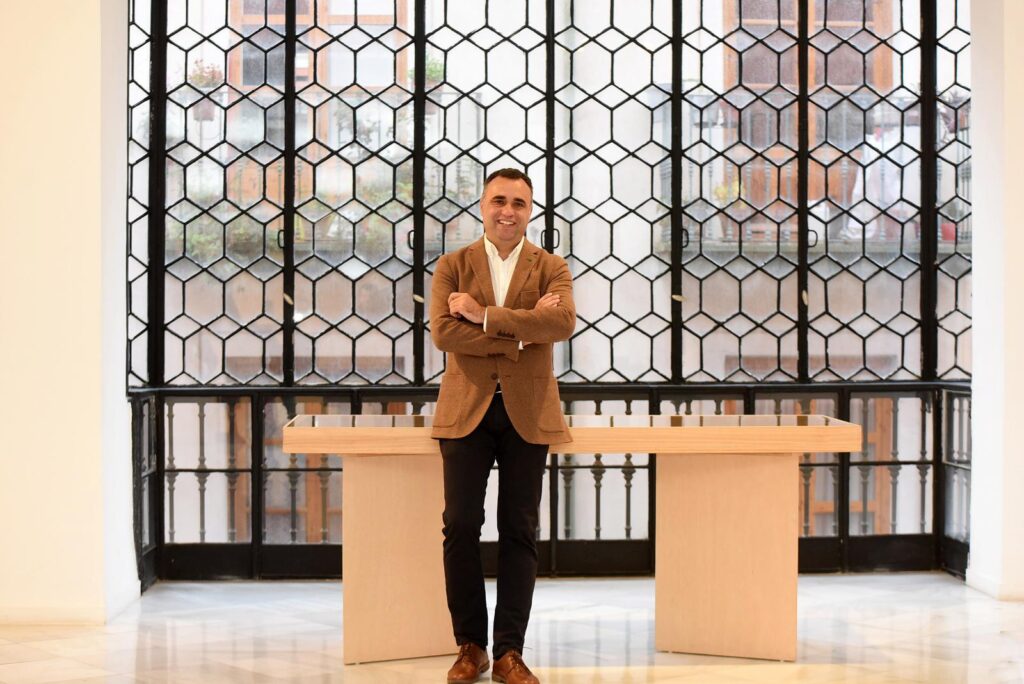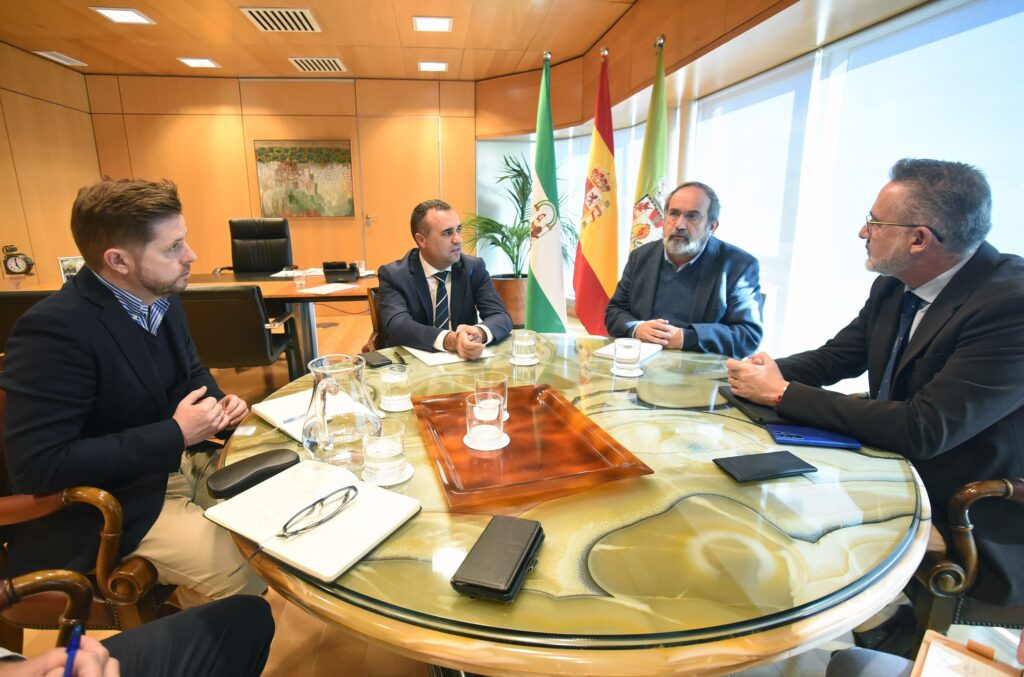“IFMIF-DONES is one of the most important projects in the recent history of Granada”
Posted on |

The president of the Diputación de Granada, Francisco Rodríguez, trusts IFMIF-DONES as a driving force for the province’s development. In his opinion, the location of the largest scientific infrastructure in the country in a completely rural environment is an example of the new socio-economic paradigm that the provincial institution will promote.
QUESTION (Q). A municipality like Escúzar, with a population of less than 1,000 inhabitants, will host the largest scientific infrastructure in Spain. What does this mean for the President of the Diputación de Granada and what does it mean for this province?
ANSWER (A). This project places us at the centre of world knowledge and one of the greatest industrial challenges facing humanity at the moment, which is to achieve clean, sustainable and inexhaustible energy.
IFMIF-DONES is one of the most important projects in the recent history of Granada, this is a fact. Being protagonists of this project is a great challenge and a great opportunity.
From the Diputación we are going to collaborate in this project aimed at finding alternative sources of energy. Fusion energy is going to be crucial in this, and it is also one of the few ways we will have to have fully sustainable energy, not only environmentally, but also economically.
We are aware of the great industrial deficit in Granada and we are sure that this facility can contribute to improving this situation.
Furthermore, it is very important for us that it is located in a small municipality in the province of Granada, a town with 835 inhabitants, according to the 2022 data. Without losing sight of the fact that its scope goes far beyond the limits of Escúzar and the province itself.
This project fits perfectly with the line of development promoted by the Diputación, as it is based on sustainability and business and industrial development. All this is fully aligned with the Diputación’s policies, being aware that its implementation goes far beyond our competences.
IFMIF-DONES will mobilise 700 million for its construction and another 50 million for its start-up. In addition, the operating cost will be 50 million per year for the lifetime of the facility.
For our part, we at the Diputación de Granada are fully committed to IFMIF-DONES because we know that for it to achieve its maximum benefits for the province, it is essential that all the administrations are fully involved.
Q. Will IFMIF-DONES be an example of the new socio-economic paradigm that the Diputación de Granada will promote?
A. Clearly, yes, we are firmly committed to the development of the industrial fabric in the province and also in rural areas. The fact that IFMIF-DONES is in a completely rural environment is a paradigm. Science, industry, high quality employment and an international project in a municipality like Escúzar reaches the pinnacle of the goodness we could want to achieve.
What it will generate around it will be enormous in scope. It will have a very important direct and indirect impact on employment, the first forecasts are for some 11,000 jobs in Granada alone in the 40 years that its construction will last.
The IFMIF-DONES Spain Consortium is preparing a ‘Strategic Human Resources Plan’ which envisages the direct recruitment of at least 200 scientists, engineers and highly qualified personnel over the next three years to cover the needs of the project.
The innovation factor is also key, research and development are an intrinsic part of IFMIF-DONES. These are exactly the lines of development and growth that we want to be able to bring to the whole province.
Granada is going to become a focus of science and knowledge, and from there, a provincial development ecosystem of great dimension will be generated.
Q. IFMIF-DONES will promote an industrial ecosystem that will benefit the rest of the province. Will the establishment of new companies help to stop the depopulation suffered by some areas? What other benefits will this new business ecosystem bring?
A. It will generate a very important business development for the Temple region, in which Escúzar is located, and also for the province.
The great challenge for the provincial institutions is to keep as much added value as possible in Granada. We must be able to provide IFMIF-DONES with as many services as it needs with our companies.
And it is also a question of Granada’s companies connecting directly with IFMIF-DONES and being able to benefit from and participate in all the development that is going to be generated around the project.
The great challenge is for the provincial business fabric to increase its level of innovation and competitiveness to be able to belong to the business ecosystem that will be configured, and the Provincial Council is fully committed to this.
Part of the challenge is that the business ecosystem that nurtures IFMIF-DONES can reach all the regions of the province.

Q. What lines of collaboration could be set up between the Diputación de Granada and the IFMIF-DONES project?
A. At the moment, we are working on the drafting of a General Protocol of Actions that aims to specify the relationship of collaboration between the Diputación de Granada and the IFMIF-DONES Spain Consortium, providing a framework that allows both to collaborate in areas of common interest within the framework of our competences.
To this end, we will work on the promotion and development of innovation projects in terms of mobility and transport between Granada and IFMIF-DONES in Escúzar, projects and initiatives that promote sustainability and sustainable development, as well as the generation of an industrial ecosystem in the province in sectors associated with extensive scientific facilities.
In this sense, both entities are interested in improving the competitiveness of companies in Granada, promoting the growth and international expansion of companies, enabling the creation of new companies, making Granada a suitable ecosystem for the development of businesses with the capacity to attract new ones, facilitating initiatives for the promotion of talent such as the organisation of training, educational and employment promotion activities in areas of common interest, as well as the improvement of infrastructures and services.
This framework of collaboration that we are weaving is based on the premise that IFMIF-DONES is a driving project and, therefore strategic, integrated into the Provincial Urban Agenda, which is the instrument that we use in the provincial institution to plan the development strategy of the Provincial Council. From there, we want to guide the sustainable urban policies of towns and cities with social, environmental and economic objectives.
Q. What measures will the Granada Provincial Council promote to ensure that innovation is present in all sectors and territories?
A. We are working on actions to support companies in Granada to raise innovation and knowledge, which would put them in a better position to access the ecosystem that IFMIF-DONES will generate.
In addition, with its resources, the Provincial Council is working to increase the degree of innovation of companies to the extent that our competencies allow us.
Specifically, in 2024, we will start up a very innovative facility, a technology-based business incubator that will be a provincial benchmark.
We are also working on refurbishing the Bueno Crespo building, which we hope to make available to business initiatives for company accommodation and the training and acceleration of new businesses in the current term of office. Its location is critical: it is in the municipality of Ogíjares, in the expansion area of the PTS and just fifteen minutes from the IFMIF-DONES facility.
In addition, the Provincial Council is putting its business advice platform at the service of companies in the province with a completely renovated website, Granada Metrópoli Empresas, equipped with multiple resources that enable business digitalisation.
P. There is a lot of talk about talent, about people as drivers of change. Can a project like IFMIF-DONES help attract, retain and promote talent in the province?
A. It is the best possible example. It is one of the pillars on which to work so that talent stays in Granada.
It is necessary to create an ecosystem in which citizens are present, just as is being done with Artificial Intelligence.
The province is shaping the ecosystem of technology companies that, together with IFMIF-DONES, can help to make the definitive leap. This is where talent plays a key role: the people who make up the broad scientific and business ecosystem being forged.